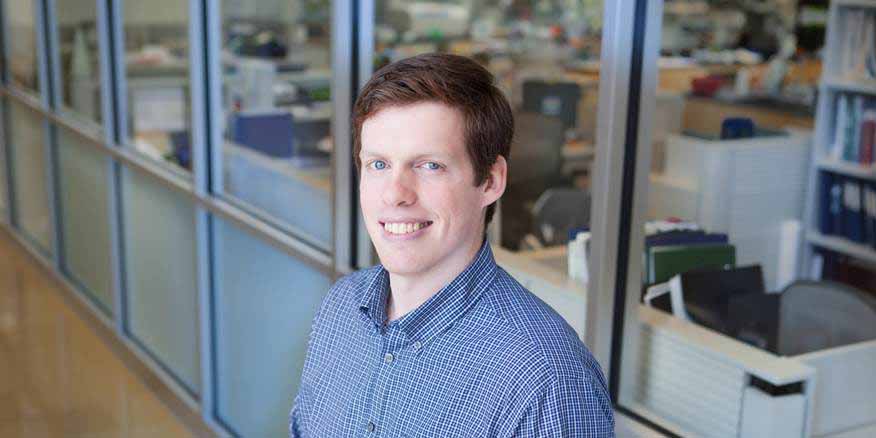
Paul Jensen receives NSF early CAREER grant to support research in AI, machine learning
The Faculty Early CAREER Development program is an NSF-wide activity that offers the foundation’s most prestigious awards in support of early-career faculty.

The Faculty Early CAREER Development program is an NSF-wide activity that offers the foundation’s most prestigious awards in support of early-career faculty.
Written by Michele Santillan and originally published by Biomedical Engineering.
Paul Jensen, Assistant Professor of Biomedical Engineering and Chemical Engineering, recently received a Faculty Early Career Development (CAREER) grant from the National Science Foundation (NSF) for his study entitled “Learning mechanistic models with automated experiments.”
To address the challenge of new species being identified at a faster pace than can be characterized by microbiologists using conventional methods, Jensen’s proposal will develop autonomous systems that combine artificial intelligence (AI) and automated wet-lab experiments to build mechanistic models of these understudied microbes. In addition, the proposal seeks to train students at rural-serving institutions to use these autonomous systems and to enable the students to continue their research upon return to their home institutions.
The Faculty Early Career Development program is an NSF-wide activity that offers the foundation’s most prestigious awards in support of early-career faculty who have the potential to serve as academic role models in research and education and to lead advances in the mission of their department or organization.
“CAREER awards combine research and education,” Jensen said. “This grant’s goal is to build a robot scientist with an artificial intelligence system that can plan, run, and interpret its own experiments. We will use this system to conduct research and train scientists who lack access to AI or laboratory robotics.”
Jensen noted that his lab had already started working on an artificial intelligence platform, called BacterAI, which enables robots to conduct up to 10,000 autonomous scientific experiments per day. The latest proposal builds on the prior work of BacterAI to uncover the biological mechanisms that underlie the results.
“We want our next robot scientist to understand what is happening with the research,” Jensen said. “Before, we had an AI that could predict the outcomes of experiments. However, it couldn’t fully explain the biology to a human scientist. The next big challenge is to automate the reasoning of a scientist during data interpretation.”
Jensen explained that the new system will be able to think as humans do when they piece together models of information. “This is a higher standard for AI, and it makes it much easier for the robot to communicate with scientists at the end of a study to report results,” he said.
“The first aim is to have the robot augment what humans already know,” Jensen explained. “The AI will start with a model that a human has built and learn how to fix the model for us. Our models have thousands of details in them, so it’s impossible for a human to verify every single thing in the model. The robot can execute virtually unlimited experiments, so it can discover changes that improve the model’s predictions.“
The second research aim is to build a recommender system to help the robot prioritize experiments. Common examples of recommender systems abound, from Amazon suggesting a gadget that a consumer might be interested in purchasing based on past orders, to Netflix offering a list of potential programming options that are similar to previous viewer selections.
“A recommender system is a type of machine learning model that says, ‘Given what we know about you, here’s what might be the next interesting topic for you.’ The robot can’t do every possible experiment, but given the experiments it has done, what experiment might it be interested in running next. We aim to achieve a concept in machine learning called serendipity. Serendipity means you are pleasantly surprised by the recommendation: ‘I didn’t know that I wanted to watch that program until you suggested it.’ We want the robots to ask questions with surprising results.”
The third aim of the CAREER grant is to open research opportunities to people who currently do not have access to AI and automated biology. “In particular, we’re going to invite students from rural institutions and smaller colleges to run experiments and conduct research using our machines remotely,” said Jensen. “The grant funds a new kind of summer research program. Each year, we’re going to welcome three students who will come to Michigan and learn how the entire system works. At the end of the summer, they will return to their home institutions, but continue conducting research remotely. They will send in their experiments, we will run them here, and then we will send back the data. In this way, the students can continue doing their research during the entire subsequent academic year.”
Jensen said the plan addresses an issue where guest students conduct research during summer programs, but then run out of time to complete their projects or write concluding papers to use for consideration at conferences or for fellowship proposals. “Over an entire year, the students will be able to complete a research project and have a more meaningful experience,” he said. “This will democratize the process from a DEI perspective by providing opportunities among students who formerly were unable to access an institution due to location, finances, or awareness of the programs. This has the potential to expand the scientific contributions and knowledge of many more people from diverse backgrounds, who, in the past, may not have had that opportunity to participate.”